Consider a scenario in which you’re travelling for work, so you need to book a hotel. You pick your preferred chain that has a location close to the office or conference venue, plug in your corporate code, and complete the booking.
You arrive at the hotel and chat up the associate for a potential upgrade, before making your way up to the room and freshening up for your first meeting of the day.
Along the way, you remember that you had overslept that morning and had forgotten to bring your work badge or business card with you on the trip, but fortunately the guy at check-in never asked to see it, or else you would’ve been in a little bit of an awkward spot and had to power-talk your way out of the situation, or something.
Seems like it could be a pretty common occurrence, right? How do these hotel corporate codes really work anyway? Who’s entitled to use them, how much of a discount do they earn, and how strictly do hotels check for eligibility?
Keeping in mind that this article is intended to be purely informational rather than an endorsement of any practices, let’s talk about hotel corporate codes and how they work. While we’re focusing on hotels here, the same principles can also be generalized to car rentals as well (although booking flights at corporate rates tends to be a more complex undertaking).
What Are Hotel Corporate Codes?
Hotel corporate codes, simply put, refer to a special booking code that a hotel chain makes available to certain companies as a means of offering wholesale pricing on hotel rooms. If a company frequently sends employees or contractors to travel on business, they might negotiate directly with their preferred hotel chain, or even multiple hotel chains, to secure nightly rates that are lower than the publicly available rates.
When an employee, contractor, or any other authorized associate of a certain company is staying with that hotel chain, they pay the corporate rate: the special negotiated rate between their company and the hotel.

These rates can vary in price significantly, and will depend entirely on several factors like the company, the hotel chain, and the location of the hotel.
Some corporate rates are a percentage discount off the best available rate, while others are a flat price regardless of what the hotel is charging otherwise. Because some corporate rates can be a flat price, there will often be times when the lowest publicly available rate is actually lower than the corporate rate, so you should always check and compare to make sure you’re booking the cheapest rate available. Of course, if you’re writing this off as a company expense, you might care either more or less about the particulars.
By now, you’ve probably realized that corporate rates between different companies can vary significantly from each other. Outside of the specific discount they offer, they can also vary between which rooms are eligible under this rate. At some hotels, it’ll be capacity controlled and limited to the base-level room, while at others, there will be corporate discounts on club rooms, standard suites, and even higher suite types.

In addition, some companies will negotiate rates that are eligible all year round, while other companies’ rates will only apply during the Monday–Friday workweek. And some rates allow for personal travel as well as business travel, while others limit the usage to business travel only.
It’s definitely worth getting familiar with your company’s corporate rate if you have access to one, as they could be the key to unlocking hotel rooms at half the usual price.
Why Might Someone Use Corporate Rates?
The obvious answer, of course, is that it can save you a fair bit of cash if the corporate rate is cheaper than the public rate. Let’s look at an example to illustrate.
Here’s the public rates at the St. Regis Toronto from Thursday, September 17 to Friday, September 18.
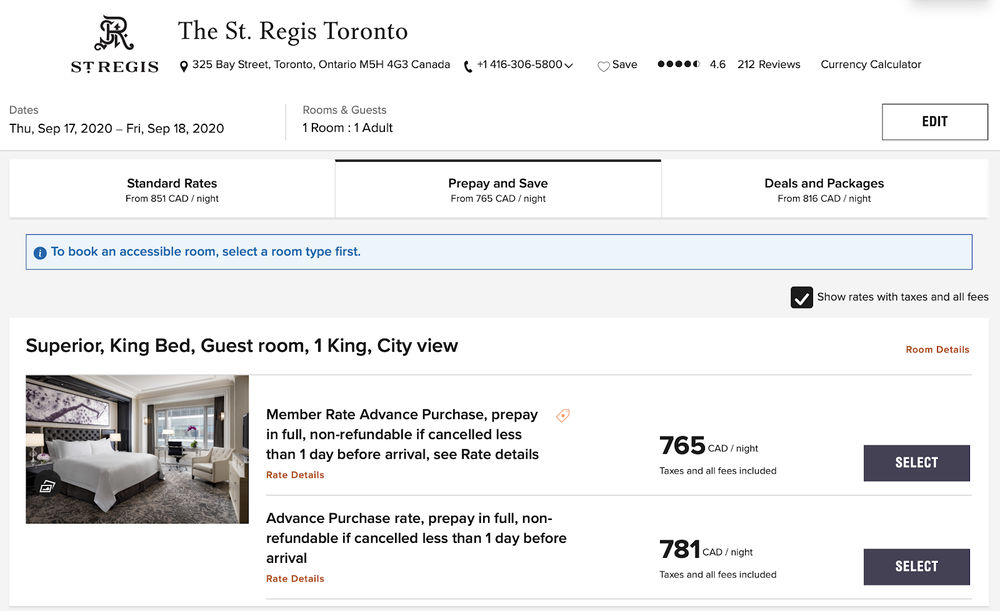
And here is the same room on a corporate room:
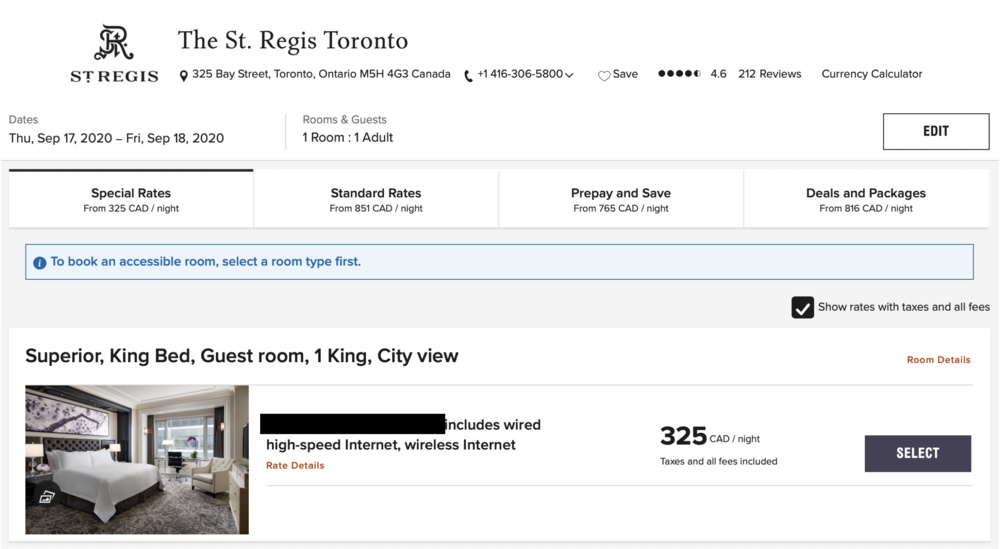
As you can tell, this represents a significant discount of $440, or 58% on the lowest publicly available rate. Keep in mind corporate rates typically also offer flexible cancellation policies (business travellers often change their plans on a last-minute basis, after all), so imagine the possibilties if you could stretch your hotel budget 50–75% farther across every stay while benefiting from flexible cancellation policies throughout.
(Let’s also take a moment and admire the “Show rates with taxes and all fees” checkmark, which seems to be a feature that Marriott recently added to their website. Where has this feature been all my life?!)
But remember that corporate rates don’t always represent a discount, as seen in this example:
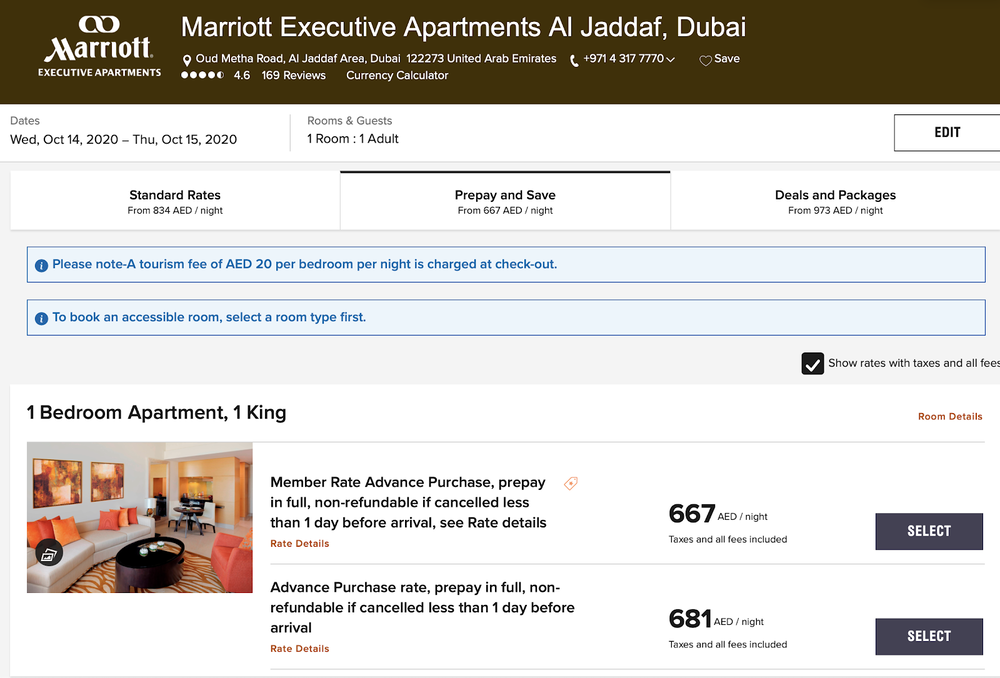
On a corporate code, the rate is 184 AED ($70) or 25% more expensive, so you’d be much better off booking the normal flexible rate in this case:
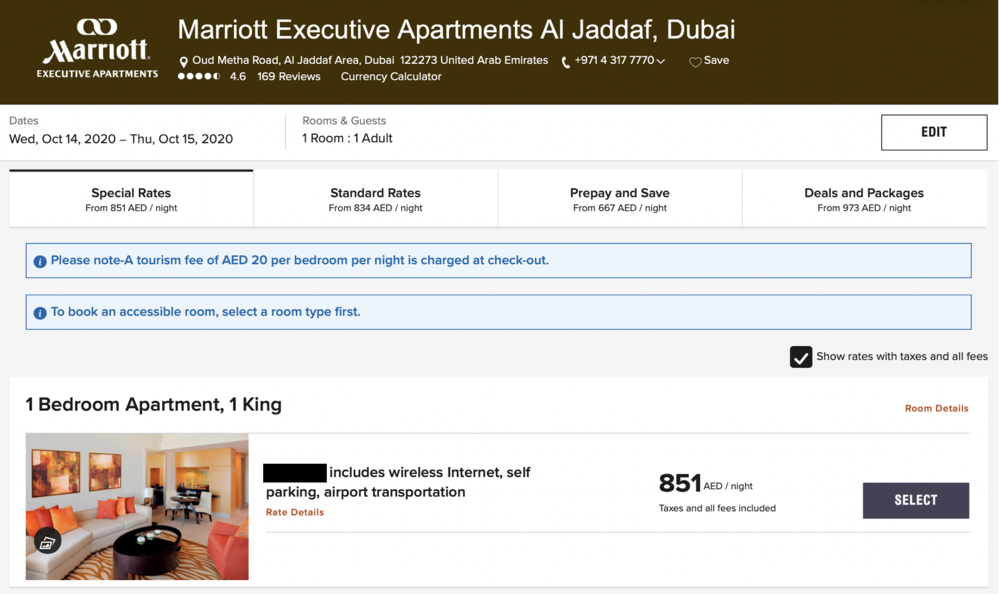
As mentioned, corporate rates vary wildly; in this case, the same corporate code was cheaper than the public rate at most other Dubai hotels, but not this one.
The reason for this could boil down to anything from a lack of negotiation at this particular hotel, to the hotel offering a temporary sale on the public rates, to the code simply offering a poor rate during the month of October. It’s important to check against the public rate rather than blindly plugging in your corporate code assuming it’ll be cheaper.
In most cases, corporate rates still allow for earning hotel loyalty points from your stay, accumulating elite qualifying nights, and taking advantage of your elite status benefits.
Some exceptions could arise if you have to book through a specific travel agency via your company, which may or may not grant these benefits, but in most cases you can expect to take full advantage of elite status since frequent business travellers are among a hotel’s most valued clientele.

The exact codes that are used to search for corporate rates tend to be proprietary information, which is why I’ve obscured the exact companies and codes used in the examples above.
However, as a hint for finding the cheapest rate, you can always take a look at which companies’ offices are physically located close to the hotel, since the company would be more likely to negotiate better deals at these hotels.
It may also be helpful to to recognize that just because information is proprietary, doesn’t mean that it is necessarily well-protected in any way. Indeed, you can probably guess what the Marriott corporate code for a certain Big 5 bank that goes by its three-letter abbreviation might be (hint: it’s also three letters long).
Things to Know When Using Corporate Codes
Let’s tackle the elephant in the room: is it an acceptable practice for a traveller to use corporate rates that they don’t technically qualify for? Like many other niche exploits in this game we play, this practice definitely falls into an ethical grey area, so only the traveller themselves can answer the question and decide what they’re comfortable with.
There’s no denying that anyone who uses corporate codes that they aren’t entitled to will be diluting the pool of legitimate uses of that code, eroding the long-term sustainability of that rate level, and essentially saving themselves a few bucks on their hotel stay while imposing that cost on future legitimate users of the code.
Nevertheless, I do think it’s prudent to warn anyone who may be entertaining these funny ideas of some potential problems they may run into.

One surface-level risk is that a hotel would be well within their rights to ask for proof of eligibility for the specific special booking code at the front desk.
For a corporate code, this might take the form of as a corporate badge or a business card – you know, one of those simple, mass-produced pieces of card stock paper that bears your name and your company’s name on it.
If the traveller is unable to provide proof of eligibility, they will charge you the walk-up rack rate, which is usually far more expensive than the lowest publicly available rate listed in the app or on the website. And if your cancellation deadline has passed by now, you’ll be forced to either pay the rack rate for your stay, or pay the cancellation penalty and find alternative lodgings for the night.
On a more serious level, if the company’s corporate code rate is only allowed to be used on business trips, but the traveller is using it for leisure, then it’s within the hotel’s rights to check up on the contract and potentially report back to the company. Whether they do so or not is their prerogative, but this is a risk I personally wouldn’t take.
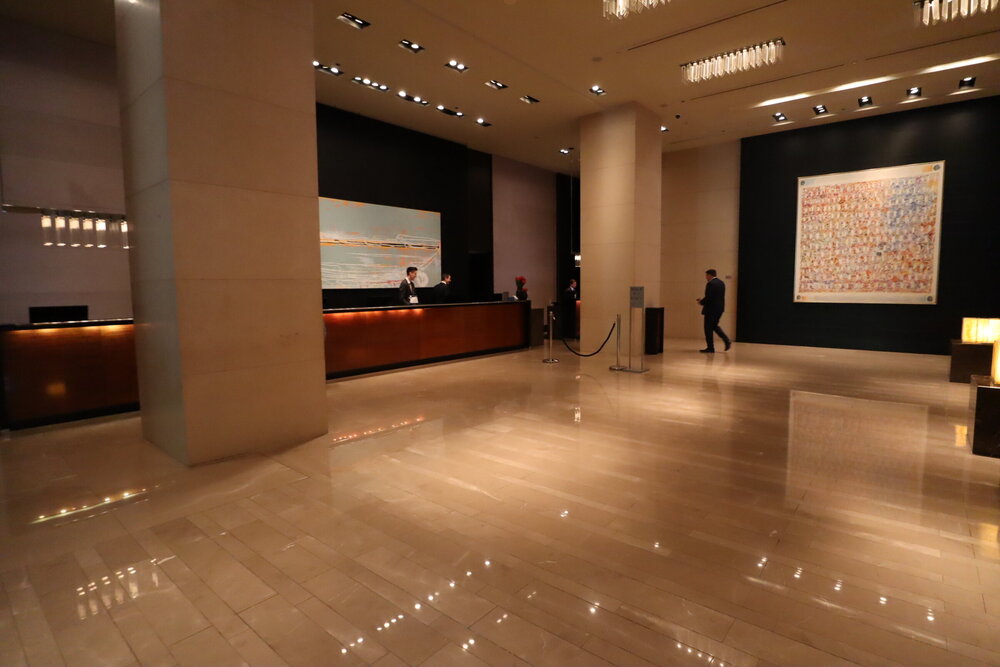
Then there’s always the chance, of course, that a hotel loyalty program may take action against an account holder based on the corporate code usage patterns across their stays. After all, what are the chances that someone works for Apple, Dell, Deloitte, IBM, and General Electric all at once?
Broadly speaking, I’d say that the chances that a hotel checking for corporate ID are pretty low on average, especially if a traveller appears to fit in with the hotel’s average corporate clientele.
For example, if you’re staying at a hotel in a major city where lots of business travel takes place, then it’s quite likely that the hotel won’t even give your corporate rate a second glance because of the volume of business travellers that they get, especially if you show up dressed smartly in business attire.
However, there’s always a chance, no matter how slim, that proof of eligibility is requested at check-in or at any point during the stay, so it’ll be up to every traveller’s own individual risk tolerance and ethical boundaries to decide if hotel corporate codes ever become more than an academic matter along their trips.
Conclusion
Hotel corporate codes allow companies to book rooms for their employees, contractors, or other associates (like corporate guests or on-site interviewees) at a discounted rate, and they can often provide discounts of 50–75% on the lowest publicly available rate for a hotel stay.
The practice of booking rooms with corporate codes that one has happened to stumble upon via a simple Google search may appear to be a lucrative strategy at first glance, but it does not come without a certain degree of risk, as hotels may always ask for proof of eligibility for the code upon check-in.
Therefore, it’s always important to understand the terms of a corporate code whenever you’re using one, and to always be prepared to show your proof of eligibility each and every time.













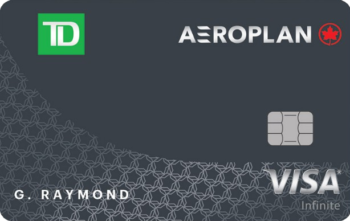






I’ve selected the general corporate rate (as a government employee I generally qualify for this – no special negotiated rate code needed) at Hilton and Marriot and only once was asked for ID – and that was when I was staying in a tropical destination where the corporate rate was more than half of what the public rate was. In that case by work ID government badge worked. I also had my government issued corporate credit card on hand just in case.
You are a GENIUS
Egg hunt!
Are there ways to become an IBM, et partner so this practice is more grey than black?
"Here’s the public rates at the St. Regis Toronto from Friday, October 9 to Saturday, October 10."
Err.. the images show Thursday, September 17 to Friday, September 18.
Corrected.
Anyone have a list of corporate codes they’re willing to share ?
I have booked via AMEX site more than 100 times on business trips using Hilton’s corporate codes in Canada, USA and Japan (Nagoya & Tokyo) and never got asked once for a corporate ID.
Hilton Nagoya’s executive lounge is not too shabby, and one can see Nagoya Marriott clearly in the skyline.
I have been asked for proof of employment several times at Marriott hotels located in Tokyo when using my company’s corporate code.
If I may ask, what type of proof did they want to see? It’s always interesting to hear about people’s experiences with this kind of stuff.
Either a business card or ID badge was requested.
As grey areas go, I’d say this one is extremely dark grey.
Agreed. I’d say it’s similar to using a Perkopolis code that you aren’t entitled to for a special credit card deal – dark grey, but still undertaken by many.
How to get this perkopolis code?
These days, the easiest above-board way seems to be by getting a no-fee Canadian Tire Card. See Kirin’s coverage: https://princeoftravel.com/blog/the-triangle-credit-cards-by-canadian-tire/